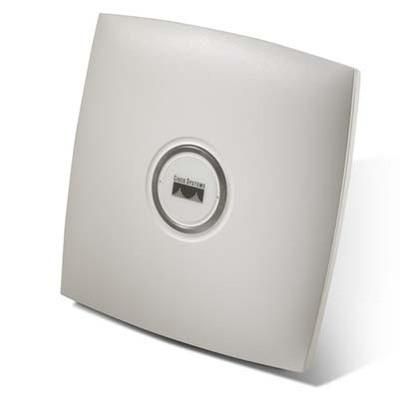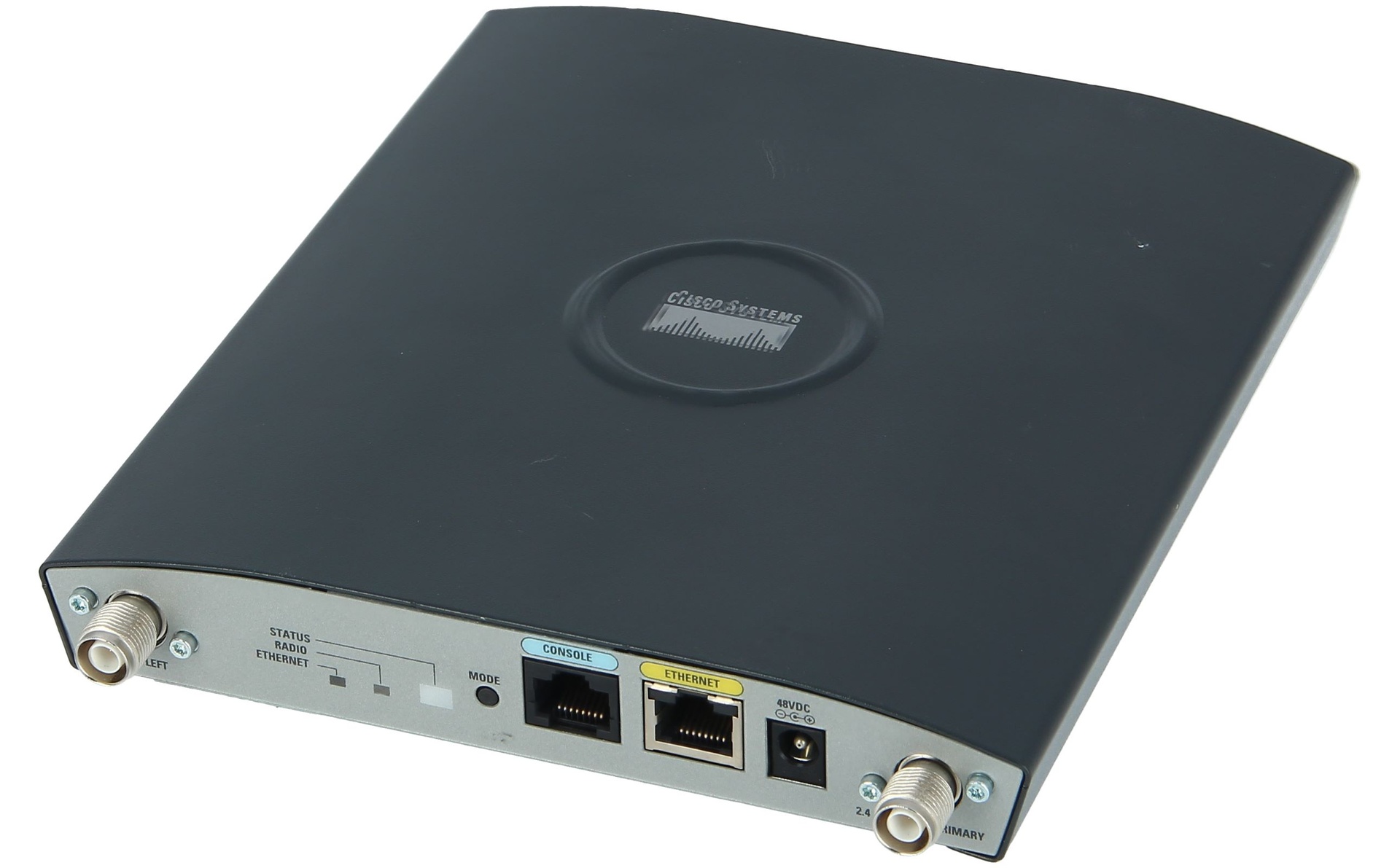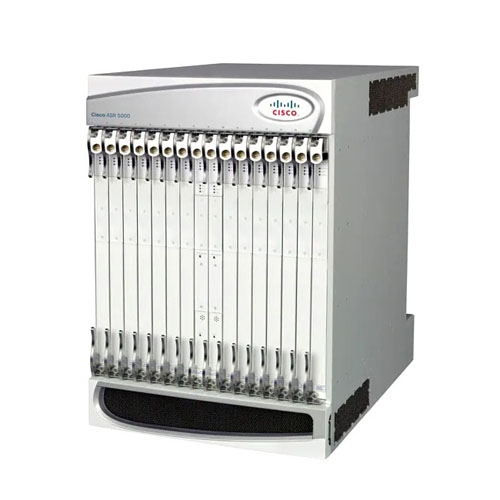The Cisco® Aironet® 1130G Series Access Point AIR-AP1131G-A-K9 is a single-band 802.11g access point that features business-class management, security, and scalability. This low-profile access point offers high-performance wireless connectivity in offices and similar environments.
The Cisco Aironet 1130G Series is available in two versions: unified or autonomous. Unified access points operate with the Lightweight Access Point Protocol (LWAPP) and work in conjunction with Cisco wireless LAN controllers and the Cisco Wireless Control System (WCS). When configured with LWAPP, the Cisco Aironet 1130G Series can automatically detect the best-available Cisco wireless LAN controller and download appropriate policies and configuration information with no manual intervention. Autonomous access points are based on Cisco IOS® Software and can optionally operate with the CiscoWorks Wireless LAN Solution Engine (WLSE). Autonomous access points, along with the CiscoWorks WLSE, deliver a core set of features and can be field-upgraded to take full advantage of the benefits of the Cisco Unified Wireless Network as requirements evolve.
Quick Spec
Figure 1 shows the appearance of AIR-AP1131G-A-K9.

Table 1 shows the quick spec.
|
Part Number |
AIR-AP1131G-A-K9 |
|
Product Description |
802.11g Integrated Auto AP; Int Antennas; FCC Cnfg 1130G Series Access Points |
|
System Memory |
• 32 MB RAM • 16 MB flash memory |
|
Input Power Requirements |
• 100-240 VAC; 50-60 Hz (power supply) • 36-57 VDC (device) |
|
Power Draw |
9.91W maximum |
|
Dimensions (H x W x D) |
7.5 in. x 7.5 in. x 1.3 in. (19.1 x 19.1 x 3.3 cm) |
|
Weight |
1.5 lb (0.67 kg) |
|
Network Standard |
IEEE 802.11b and 802.11g |
|
Data Rates Supported |
802.11g: 1, 2, 5.5, 6, 9, 11, 12, 18, 24, 36, 48, and 54 Mbps |
Compare to Similar Items
Table 2 shows the comparison between AIR-AP1131G-A-K9 and AIR-LAP1131G-A-K9.
|
Part Number |
AIR-AP1131G-A-K9 |
|
|
Product Description |
802.11g Integrated Auto AP; Int Antennas; FCC Cnfg 1130G Series Access Points |
802.11g Integrated Unified AP; Int Antennas; FCC Cnfg 1130G Series Access Points |
|
System Memory |
• 32 MB RAM • 16 MB flash memory |
• 32 MB RAM • 16 MB flash memory |
|
Input Power Requirements |
• 100-240 VAC; 50-60 Hz (power supply) • 36-57 VDC (device) |
• 100-240 VAC; 50-60 Hz (power supply) • 36-57 VDC (device) |
|
Power Draw |
9.91W maximum |
9.91W maximum |
|
Dimensions (H x W x D) |
7.5 in. x 7.5 in. x 1.3 in. (19.1 x 19.1 x 3.3 cm) |
7.5 in. x 7.5 in. x 1.3 in. (19.1 x 19.1 x 3.3 cm) |
|
Weight |
1.5 lb (0.67 kg) |
1.5 lb (0.67 kg) |
Get more information
Do you have any question about the AIR-AP1131G-A-K9?
Contact us now via Live Chat or [email protected].
AIR-AP1131G-A-K9 (USED) Specification
AIR-AP1131G-A-K9 Specification |
||
|
Part Number |
AIR-AP1131G-A-K9 |
|
|
Product Description |
802.11g Integrated Auto AP; Int Antennas; FCC Cnfg 1130G Series Access Points |
|
|
Software |
Cisco IOS Software |
|
|
Data Rates Supported |
802.11g: 1, 2, 5.5, 6, 9, 11, 12, 18, 24, 36, 48, and 54 Mbps |
|
|
Network Standard |
IEEE 802.11b and 802.11g |
|
|
Uplink |
Autosensing 802.3 10 and 100BASE-T Ethernet |
|
|
Frequency Band and Operating Channels |
Americas (FCC) • 2.412 to 2.462 GHz; 11 channels • ETSI • 2.412 to 2.472 GHz; 13 channels Japan (TELEC) • 2.412 to 2.472 GHz; 13 channels Orthogonal Frequency Division Multiplexing (OFDM) • 2.412 to 2.484 GHz; 14 channels Complementary Code Keying (CCK) • 5.15 to 5.25 GHz; 4 channels Japan-P (TELEC 2 (Japan2) Cnfg) • 2.412 to 2.472 GHz; 13 channels Orthogonal Frequency Division Multiplexing (OFDM) • 2.412 to 2.484 GHz; 14 channels Complementary Code Keying (CCK) • 5.15 to 5.35 GHz, 8 channels Japan-Q • 2.412 to 2.472 GHz; 13 channels Orthogonal Frequency Division Multiplexing (OFDM) • 2.412 to 2.484 GHz; 14 channels Complementary Code Keying (CCK) • 5.15 to 5.35 GHz; 8 channels • 5.470 to 5.725 GHz; 11 channels |
|
|
Nonoverlapping Channels |
802.11b/g: 3 |
|
|
Receive Sensitivity (Typical) |
802.11g: • 1 Mbps: -93 dBm • 2 Mbps: -91 dBm • 5.5 Mbps: -88 dBm • 6 Mbps: -86 dBm • 9 Mbps: -85 dBm • 11 Mbps: -85 dBm • 12 Mbps: -84 dBm • 18 Mbps: -83 dBm • 24 Mbps: -79 dBm • 36 Mbps: -77 dBm • 48 Mbps: -72 dBm • 54 Mbps: -70 dBm |
|
|
Available Transmit Power Settings (Maximum Power Setting Will Vary by Channel and According to Individual Country Regulations) |
802.11b: CCK: • 20 dBm (100 mW) • 17 dBm (50 mW) • 14 dBm (25 mW) • 11 dBm (12 mW) • 8 dBm (6 mW) • 5 dBm (3 mW) • 2 dBm (2 mW) • -1 dBm (1 mW) |
802.11g: OFDM: • 17 dBm (50 mW) • 14 dBm (25 mW) • 11 dBm (12 mW) • 8 dBm (6 mW) • 5 dBm (3 mW) • 2 dBm (2 mW) • -1 dBm (1 mW)
|
|
Range |
Indoor (Distance Across Open Office Environment): |
Outdoor: |
|
802.11g: • 100 ft (30m) @ 54 Mbps • 175 ft (53m) @ 48 Mbps • 250 ft (76m) @ 36 Mbps • 275 ft (84m) @ 24 Mbps • 325 ft (100m) @ 18 Mbps • 350 ft (107m) @ 12 Mbps • 360 ft (110m) @ 11 Mbps • 375 ft (114m) @ 9 Mbps • 400 ft (122m) @ 6 Mbps • 420 ft (128m) @ 5.5 Mbps • 440 ft (134m) @ 2 Mbps • 450 ft (137m) @ 1 Mbps |
802.11g: • 120 ft (37m) @ 54 Mbps • 350 ft (107m) @ 48 Mbps • 550 ft (168m) @ 36 Mbps • 650 ft (198m) @ 24 Mbps • 750 ft (229m) @ 18 Mbps • 800 ft (244m) @ 12 Mbps • 820 ft (250m) @ 11 Mbps • 875 ft (267m) @ 9 Mbps • 900 ft (274m) @ 6 Mbps • 910 ft (277m) @ 5.5 Mbps • 940 ft (287m) @ 2 Mbps • 950 ft (290m) @ 1 Mbps |
|
|
Ranges and actual throughput vary based upon numerous environmental factors, so individual performance may differ. |
||
|
Compliance |
Standards Safety • UL 60950-1 • CAN/CSA-C22.2 No. 60950-1 • UL 2043 • IEC 60950-1 • EN 60950-1 • NIST FIPS 140-2 level 2 validation Radio Approvals • FCC Part 15.247 • RSS-210 (Canada) • EN 300.328 (Europe) • ARIB-STD 33 (Japan) • ARIB-STD 66 (Japan) • AS/NZS 4268.2003 (Australia and New Zealand) • EMI and Susceptibility (Class B) • FCC Part 15.107 and 15.109 • ICES-003 (Canada) • VCCI (Japan) • EN 301.489-1 and -17 (Europe) Security • 802.11i, WPA2, WPA • 802.1X • AES, TKIP • FIPS 140-2 Pre-Validation List • Common Criteria (when running Cisco IOS Software) Other • IEEE 802.11g • FCC Bulletin OET-65C • RSS-102 |
|
|
Antennas |
• 2.4 GHz • Gain: 3.0 dBi • Horizontal beam width: 360° |
|
|
Security |
Authentication Security Standards • WPA • WPA2 (802.11i) • Cisco Temporal Key Integrity Protocol (TKIP) • Cisco Message Integrity Check (MIC) • IEEE 802.11 Wired Equivalent Privacy (WEP) keys of 40 and 128 bits 802.1X EAP types: • EAP Flexible Authentication via Secure Tunneling (EAP FAST) • Protected EAP Generic Token Card (PEAP GTC) • PEAP Microsoft Challenge Authentication Protocol Version 2 (PEAP MSCHAP) • EAP Transport Layer Security (EAP TLS) • EAP Tunneled TLS (EAP TTLS) • EAP Subscriber Identity Module (EAP SIM) • Cisco LEAP Encryption • Advanced Encryption Standard Counter Mode with Cipher Block Chaining Message Authentication Code Protocol (AES CCMP) encryption (WPA2) • TKIP (WPA) • Cisco TKIP • WPA TKIP • IEEE 802.11 WEP keys of 40 and 128 bits |
|
|
Status LEDs |
External: • Status LED indicates operating state, association status, error or warning condition, boot sequence, and maintenance status Internal: • Ethernet LED indicates status of activity over the Ethernet • Radio LED indicates status of activity over the radios |
|
|
Dimensions (H x W x D) |
7.5 x 7.5 x 1.3 in. (19.1 x 19.1 x 3.3 cm) |
|
|
Weight |
1.5 lb (0.67 kg) |
|
|
Environmental |
Operating • Altitude: 0 to 2500m • 32 to 104°F (0 to 40°C) • 10 to 90% humidity (noncondensing) Non Operating • -40 to 158F (-40 to 70C) • Up to 95% humidity (noncondensing) |
|
|
System Memory |
• 32 MB RAM • 16 MB flash memory |
|
|
Input Power Requirements |
• 100-240 VAC; 50-60 Hz (power supply) • 36-57 VDC (device) |
|
|
Power Draw |
9.91W maximum |
|









Customer questions & answers
Customer reviews
0 out of 5
No reviews yet